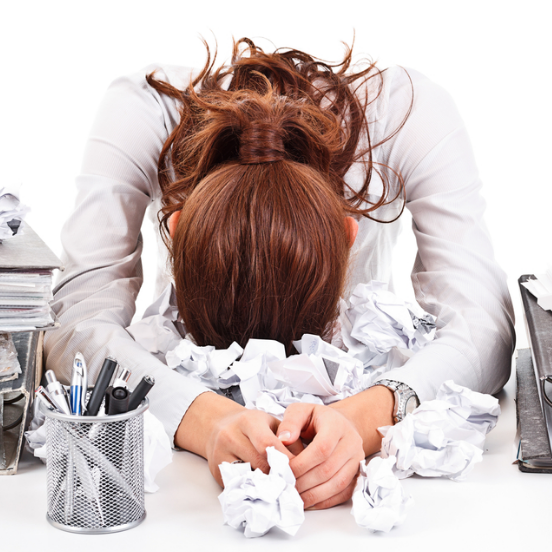Back to Business as Usual
Katie Noble, SPCNM Graduate Practitioner 2019
The summer holidays are drawing to a close and with everyone returning to school and work life is returning to “normal”, which unfortunately can mean that stress levels start to creep up as well.
I recently found a cute little notebook I’d bought for party gifts for my daughter’s 10th birthday party. The last page has a cartoon of a man on the run, clutching his briefcase slurping a coffee and a little story:
“Hello, I’m Mr BABBA,
I don’t have time to drink or meet girls cause I’m a workaholic!
Every day I spend most of my time at work and it’s hard to stop.
If you want to see me, just look under a pile of papers.”
It made me laugh and granted it is more of a 90’s representation of a busy life. As a culture we have come a long way with flexible work hours and an understanding of the impact of stress on our health and wellbeing. But this flexi-time is also offset with constantly being entertained or connected digitally. This makes life incredibly convenient and it is the modern way of living, but heading into a new year is a good time to assess how to make the most of the year ahead and protect your precious physical and mental health.
Consider how the following areas of your life are going. Small improvements in these areas can change the trajectory of your long-term health and wellbeing.
Sunshine
Regular safe exposure for 20 mins per day before 10 and after 4pm without sunscreen is the best way to boost vitamin D which is essential for bone and immune system health. Sun has added benefits of regulating melatonin balance in the body which is a major antioxidant, lowering blood pressure and improving glucose tolerance.
Stress
How can you carve out some time for yourself? Sometimes stopping and taking 10 nice slow breaths between work and home life can help reset the system. Breathe in for 5, hold for 5, breath out for 5 and hold for 5. My goal for this year is to consider one day a week a day of rest with no household chores, work or shopping instead having a fun day to relax and unwind and pretend I am on holiday. This idea may not work for you but what could you do to find more time to just be?
Food
Focus on increasing colourful fruits and vegetables into your diet to provide a broad range of nutrients and antioxidants and include lots of green vegetables. No single food delivers all the necessary nutrients for overall health and wellness and diversity is key. Take some time to observe how your body feels after eating different foods. There is no one diet that suits everyone, and some people are better suited to a naturally low fat / higher carbohydrate diet – more like the Mediterranean diet, and others do better on a low carb / high fat diet. The important thing is working out what is right for you and enjoy your food. Take time to eat it and plan ahead to avoid the pitfall of consuming more processed foods.
Exercise
Focus on working out what exercise you really enjoy, research shows that you are more likely to continue with an exercise programme if you derive enjoyment from the experience, however it is important to keep pushing yourself! If you are thinking of increasing your exercise then do it slowly and let it become habitual. Look at how you can increase your incidental exercise – park a bit further away, use the stairs and stand up and move around if you have a desk job.
Coffee and Alcohol
Step back and have a look at how much and often you are enjoying these beverages. Can you reduce your coffee intake by one per day and only before lunch to prevent any negative effects on sleep? If you drink alcohol daily can you commit to 2-3 alcohol free days a week to give your body a break?
Sleep
When we turn in for the night, our bodies get busy. Muscles relax; tissue repairs; energy is restored; hormones are released (including ones vital to appetite regulation); and the immune system gets a boost. As adults we still need 7-9 hours a night to function well, but we are all different. Try counting back from when you need to be up to set your bed time. Start with 8 hours and see how you go, if you find yourself still needing the alarm in the morning go to bed earlier until you find the sweet spot for you. If sleep is a problem find a good naturopath and get some help.
References:
Eliopoulos, C. (2014). Invitation to holistic health: A guide to living a balanced life. Burlington, MA: Jones & Bartlett Learning.
Arthur, R. (Speaker). (2019, January). Should we rethink high dose vitamin D? [Audio podcast]. Retrieved from https://rachelarthur.com.au
Minich, D. (2018). 6 reasons your diet needs to include a diverse range of foods. Retrieved from https://www.deannaminich.com/food-diversity/
Zenko, Z., Ekkekakis, P., & Areily, D. (2016). Can you have your vigorous exercise and enjoy it too? Ramping intensity down increases postexercise, remembered, and forecasted pleasure. Journal of Sport and Exercise Psychology, 38 (2), 149-159. doi:10.1123/jsep.2015-0286




